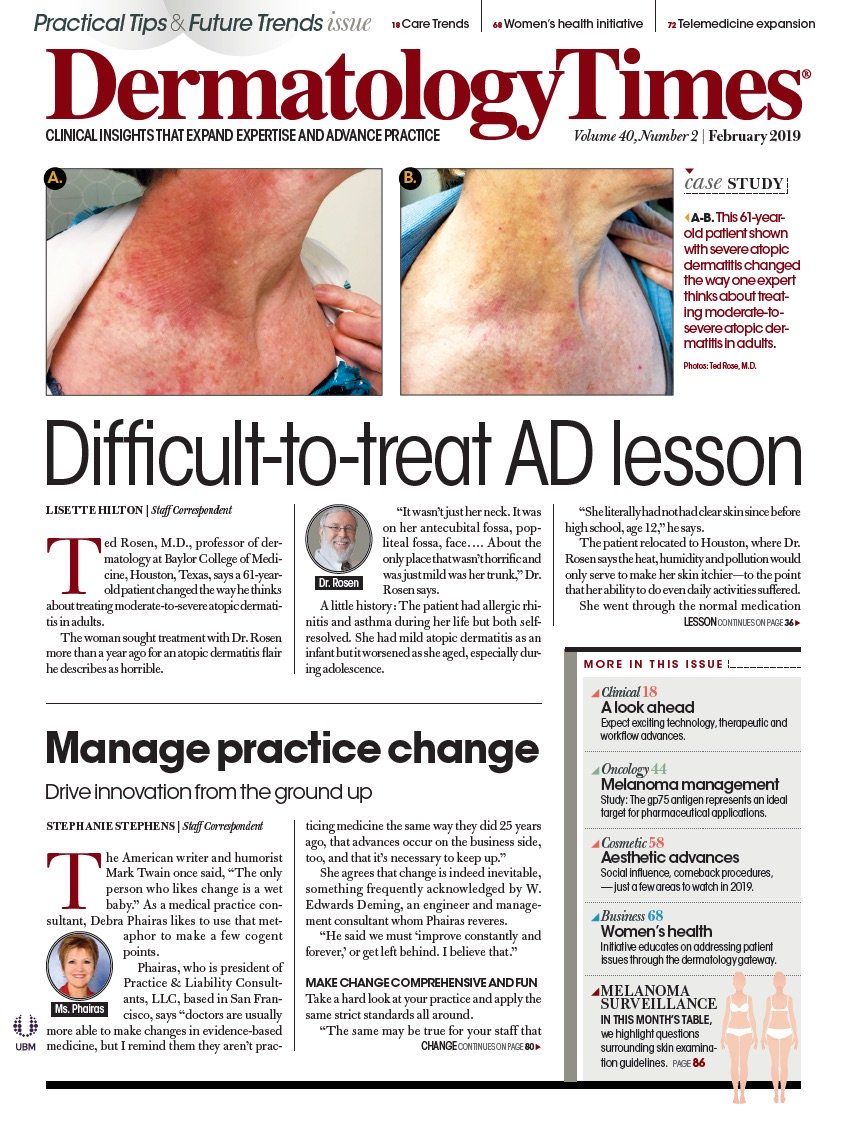- Acne
- Actinic Keratosis
- Aesthetics
- Alopecia
- Atopic Dermatitis
- Buy-and-Bill
- COVID-19
- Case-Based Roundtable
- Chronic Hand Eczema
- Drug Watch
- Eczema
- General Dermatology
- Hidradenitis Suppurativa
- Melasma
- NP and PA
- Pediatric Dermatology
- Pigmentary Disorders
- Practice Management
- Precision Medicine and Biologics
- Prurigo Nodularis
- Psoriasis
- Psoriatic Arthritis
- Rare Disease
- Rosacea
- Skin Cancer
- Vitiligo
- Wound Care
Publication
Article
Dermatology Times
How to manage practice change
Author(s):
Medical practice consultant Debra Phairas offers advice for physicians who are trying to implement practice change.
"Change isn’t easy, it takes a conscious effort and mindfulness—along with collaboration. Most important, it takes focusing on the patient," says David C. Aron, M.D., research professor, Cleveland VA Medical Center and Case Western Reserve University. (Jacob Lund - stock.adobe.com)

The American writer and humorist Mark Twain once said, “The only person who likes change is a wet baby.” As a medical practice consultant, Debra Phairas likes to use that metaphor to make a few cogent points.
Phairas, who is president of Practice & Liability Consultants, LLC, based in San Francisco, says “doctors are usually more able to make changes in evidence-based medicine, but I remind them they aren’t practicing medicine the same way they did 25 years ago, that advances occur on the business side, too, and that it’s necessary to keep up.”
She agrees that change is indeed inevitable, something frequently acknowledged by W. Edwards Deming, an engineer and management consultant whom Phairas reveres.
“He said we must ‘improve constantly and forever,’ or get left behind. I believe that.”
MAKE CHANGE COMPREHENSIVE AND FUN
Take a hard look at your practice and apply the same strict standards all around.
“The same may be true for your staff that needs an up-to-date standard of care, but also needs a good photocopier, along with new computers and software on a regular basis to do the best job,” Phairas says.
When she goes into a practice for an evaluation, she approaches the task much like a physician, “doing a complete history and physical.” She initiates the process by inviting staff to weigh in, a move that would likely gain Deming’s approval.
“He said changes should happen from the ground up and not the top down,” she says. “People doing their jobs every day know what else needs to be done-and changed. I encourage the physician and manager to really listen to staff, who will know ideas will be welcomed instead of shot down.”
Get creative. Consider holding contests for the “best idea,” with prizes like credit-card-acquired airline miles or a gift certificate-or maybe even time off.
THINK POSITIVE
“As a leader, and as a ‘salesperson,’ you don’t want to be negative,” Phairas says. “Instead, think of being persuasive, confident, and upbeat about supporting the need for change and the benefits it will bring.”
Talk openly about what staff imagines is the worst that can happen, or about other objections, she says. Then you ask questions like:
- “Who’s going to be willing to try this?”
- “What are you doing that you think is redundant?”
- “Why are you still doing it?”
The reply to the last question is often “because it’s the way we’ve always done it.” Phairas suggests a follow-up of, “What do you think might be more efficient and better for doctors, staff and patients?”
Historically, a third of participants will be early adopters, a third will be naysayers and the remaining third will sit squarely in the middle, she says.
“It’s important to tell the early adopters, ‘I’m so pleased you’re willing to try,’ and I’m optimistic that others will come along with you,” says Phairas. “Celebrate the old, yet articulate how good things will be in the future.”
Don’t be afraid to “mix it up,” and have the front desk sit with billing, for example, so both can learn how-and why-the other works as they do.
“Get them to problem-solve together on quality improvement techniques,” Phairas says. “Make a flow chart and document ‘steps we do to achieve this’ to see real progress.”
WHAT THE SCIENCE SAYS
“Clinical practice change is difficult.” So begins the background explanation of a small 2017 study in Implementation Science, for which endocrinologist David C. Aron, M.D., was a co-author. Dr. Aron is a research professor at Cleveland VA Medical Center and Case Western Reserve University.
“This is illustrated by the proverbial 17-year time lag from idea to practice and the lag in evidence use in practice,” the study reports.
The study cites physicians’ “difficult time” adopting new practices, and having even more trouble “unlearning” outmoded ones. It also notes “sparse literature” on the unlearning part.
The authors acknowledge that physicians face various struggles in order to successfully change practice and restore the “equilibrium.” They also conclude that this struggle involves evidence itself and tensions between evidence and context.
“This process occurs in the context of the whole system in which physicians practice,” they say.
REMEMBER WHY YOU CHANGE
We all know change isn’t easy, but “it takes a conscious effort and mindfulness-along with collaboration,” says Dr. Aron. “Most important, it takes focusing on the patient.”
Meanwhile, don’t forget to be kind to yourself.
“When physicians look inside and think about changes in their practice, they may ask themselves, ‘What was I doing before? Was I actually hurting someone?’” he says.
“You were doing the best you could with the information you had available,” Dr. Aron says. “During my 40-year career, the pendulum has swung for many things we do in medicine, more than once, good then bad, then good again.”
The authors conclude that clinical practice is in a constant state of change-which is multidirectional-with unlearning and learning being “punctuation” marks in the spectrum.
So go forward and make change so you don’t miss a thing. Do so with this John F. Kennedy quote in mind, says Phairas. “Change is the law of life. And those who look only to the past or present are certain to miss the future.” Â
Reference
The physician’s experience of changing clinical practice: a struggle to unlearn; Implementation Science 2017 12:28; Divya M. Gupta, Richard J. Boland Jr. and David C. Aron; Published: 28 February 2017

Newsletter
Like what you’re reading? Subscribe to Dermatology Times for weekly updates on therapies, innovations, and real-world practice tips.





























